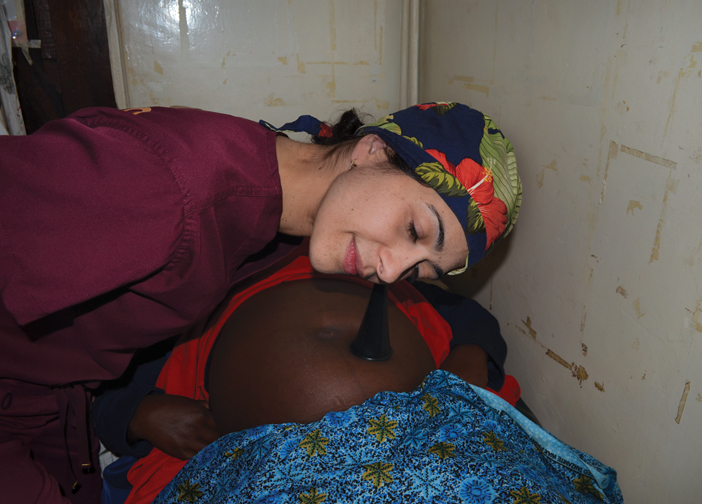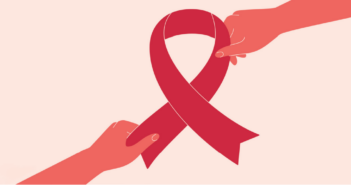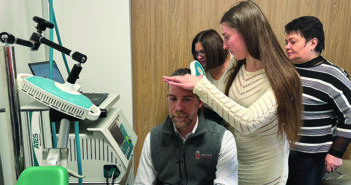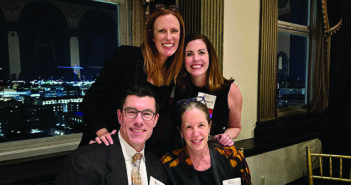An alumna is changing the world, one mother at a time.
You might call Tara Shirazian ’99 MD’03’s office in midtown Manhattan a little cluttered. From wall to ceiling are boxes of birth kits, prenatal vitamins, and medical supplies donated to Saving Mothers, the nonprofit
she cofounded in 2009 to help prevent women in the developing world from dying in pregnancy and childbirth.
As the organization’s president and medical director, Shirazian travels about six weeks a year to the three countries where Saving Mothers operates: Guatemala, the Dominican Republic, and Kenya. When she’s stateside, she’s soliciting donors for funding, medical supplies, and equipment; persuading colleagues to join short-term medical missions; and handling staffing, budget issues, and other day-to-day concerns.
She’s also an assistant professor of obstetrics and gynecology and director of Global Women’s Health at NYU Langone Medical Center.
“As you might imagine, my hobbies are sleeping and taking care of my kids,” says Shirazian, the mother of two young children. She met her husband, Michael Schwartz ’99 MD’03, at Brown. (Her brother, Shayan Shirazian ’01 MD’05, followed her into the Program in Liberal Medical Education.)
Born in Baltimore to parents who emigrated from Iran to work as immunologists at Johns Hopkins Medical Center, Shirazian discovered her passion for service as a 19-year-old in the PLME. For her Emergency Medical Systems course, she observed daily operations in Rhode Island Hospital’s emergency department. She realized that medical care was compromised by language barriers between providers and patients from local immigrant communities, where as many as 50 different languages were spoken.
For a class paper, she proposed using Brown students to launch an Interpreter’s Aide Program at the hospital. She brought the idea to the dean of the Medical School; the program continues to this day, and interpretation for hospital patients is now required by Rhode Island law.
“I know it sounds cliché, but that taught me that you really can change the world,” she says. “It also propelled me into medicine and made me feel passionately about health care for those without access. Saving Mothers is essentially born out of those principles.”
During residency Shirazian traveled to Honduras for a medical mission, but was “troubled by the idea that there were no systems in place to continue to care for these women after we were gone, and that we were just putting a Band-Aid on the problem,” she says.
Believing that health care in developing countries needs to be long term and sustainable, she and a colleague, Nichole Young-Lin, MD, MBA, founded Saving Mothers. They first worked in Guatemala when a mudslide destroyed a hospital. “The idea was to focus on what we knew best: birth and the after-care period,” Shirazian says. “A large part of the challenge is that many of the caregivers we train and pay have either limited or no language and literacy skills.”
Since it began, Saving Mothers has trained more than 300 birth attendants and performed nearly 2,000 gynecological surgical procedures free of charge. They are providing ob/gyn subspecialty training for a physician at a rural hospital in Kenya. This hospital—which serves more than 300,000 women—does not have an ob/gyn on staff, so the training could vastly improve the quality of care for women in the region.
With 350,000 women dying in childbirth every year worldwide and 99 percent of maternal deaths occurring in developing countries, Shirazian wants Saving Mothers to become the global maternal experts for everyone. “We don’t need to be in 100 countries, but we’d like to say to nongovernmental organizations in other countries that we can help you set up low-cost, high-impact interventions,” she says.
Shirazian says she’s often asked if she thinks that her time and effort on behalf of Saving Mothers is making a difference. “My answer is that I know it makes a difference,” she says, “because I’ve seen it.”




